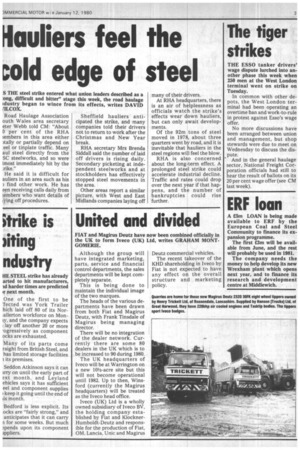Hauliers feel the cold edge of steel
Page 5

If you've noticed an error in this article please click here to report it so we can fix it.
S THE steel strike entered what union leaders described as a long, difficult and bitter" stage this week, the road haulage odustry began to wince from its effects, writes DAVID TILCOX.
Road Haulage Association outh Wales area secretary eter Webb told CM: "About 0 per cent of the RHA lembers in this area either )tally or partially depend on :eel or tinplate traffic. Many aul steel directly from the SC steelworks, and so were most immediately hit by the He said it is difficult for auliers in an area such as his ) find other work. He has een receiving calls daily from iembers who want details of Lying off procedures. Sheffield hauliers anticipated the strike, and many companies told their drivers not to return to work after the Christmas and New Year break.
RHA secretary Mrs Brenda Siddall said the number of laid off drivers is rising daily. Secondary picketing at independent steelworks and at stockholders has effectively stopped steel movements in the area.
Other areas report a similar picture, with West and East Midlands companies laying off many of their drivers.
At RHA headquarters, there is an air of helplessness as officials watch the strike's effects wear down hauliers, but can only await developments.
Of the 92m tons of steel moved in 1978, about three quarters went by road, and it is inevitable that hauliers in the steel regions will feel the blow.
RHA is also concerned about the long-term effect. A prolonged steel strike could accelerate industrial decline. Traffic and rates could drop over the next year if that happens, and the number of bankruptcies could rise further.












































































































